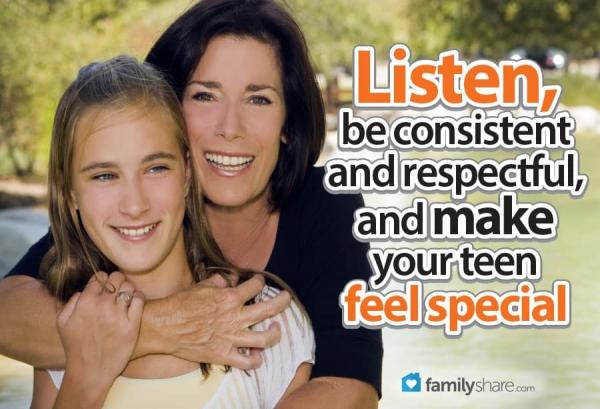
The word teenager sends shivers up the spine, a pit in the stomach, and a massive headache into most parents. If you find yourself having a hard time trying to figure out how to treat your teen in the advice department you're not the only one.
One of the most famous quotes from the book The Art of War says, "So it is said that if you know your enemies and know yourself, you can win a hundred battles without a single loss."� Just replace the word "enemy"� with "your teenager"� and you get the point. Understanding parts of your teenager will help you parent in a way that is conducive to both of you.
Be a good listener
Be willing to listen AT ALL TIMES! Notice how the last three words are in all capital letters? It's that important. Your teen is trying to figure out a world that can be difficult and uncomfortable. When they reach out to you it's a big step out of a comfort zone. Flip the roles really quick - how would you feel if you asked someone close to you for help only to be ignored, or have that person react with exasperation, and displeasure? I know personally I would never ask that person for help or advice ever again. Why? I just made myself vulnerable to that person and they shot me down.
When your child comes to you while you're working on the computer, turn off that computer screen and give them your full attention. If you are in the middle of work and can't stop, turn to your child and say something like, "I'm in the middle of this paragraph and want to finish it up before I forget what I'm going to say. Give me five minutes to finish it up?" In that response you are not only showing your child you are willing to listen to them but you are compromising, and being respectful.
Be Consistent
Being consistent applies to everything that you have to do with your teen. Here are just a few topics you should be consistent with:
-
Listening
-
Keeping a cool head during a topic that might not make you so happy
-
Being respectful
-
Being loving
-
Thanking your child for sharing their feelings or experiences with you
Being consistent helps decrease the chance of your teen feeling like they won't be able to share something with you because they are terrified of not knowing how you will react.
Be Respectful
If you want your teen to respect you, lead by example. This isn't always easy if your teen throws a lot of disrespect your way. If that's case you should try pointing out things they say to you that are disrespectful. Remember your teen didn't come with a handbook, but they didn't get a handbook on how to respect their parents, either.
When you show your teen some respect you are also showing them that you are treating them like an adult. A teen (especially in the late adolescent stage) is trying to become an adult. Thus they want to be treated like one and make decisions like one. As you and I know, that's not fully possible because they are still children. This is when you give your teen some leeway.
Make it Special
Every time I had a horrible day when I was young I knew one thing for sure. If I told my father about it he would take us out for a soda. I remember how when I would tell him how I bad I felt it didn't seem to bother me that much with the sips of soda in between and a father that would just be more than happy to listen. To this very day when I have a downright rotten day I go get myself a big soda and hash it out.
You may not like soda - that's OK; you need to find something you can do with your teen that will make them feel special. Next time your child asks you if you two could talk, why not say, "Sure! But can I ask? Is this a conversation that we should be having over ice cream?" or "Of course we can. But I'm starving! Do you want to talk about this over some (insert favorite food)?" Talking over food and making sure you have a full stomach is a great way to start a conversation with your teen. It helps make sure that you won't overreact or underreact to what your teen is about to share with you.
Listen, be consistent and respectful, and make your teen feel special. It may be rough for a few years, but your teen will remember that you weren't just a great listener - you always made sure that they felt just a little special when they shared things with you.

